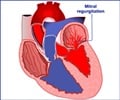Elevated levels of a protein released by damaged heart tissue may be a helpful signal for doctors to treat heart symptoms aggressively with surgery.
Elevated levels of a protein released by damaged heart tissue may be a helpful signal for doctors to treat heart symptoms aggressively with surgery. Performing heart bypass surgery or angioplasty on patients with elevated levels of the protein troponin reduced mortality rates by an estimated 40 percent.
"Any sign of heart damage by troponin, whether a small amount or a large amount, was a sign that the patient was at high risk of having another heart attack or recurrent, worsening chest pains," said Christopher Cannon of Brigham and Women’s Hospital in Boston. "We were pleased to see that this simple blood test for heart damage can be such a useful tool to pick out the best treatment for our patients," he said.The three-year study included 2,220 patients who arrived at hospitals suffering from unstable angina or chest pains caused by an inadequate supply of oxygen to the heart. The study found that mortality rates were also reduced among patients with only slightly elevated levels of troponin who were treated quickly with anti-clotting drugs.











